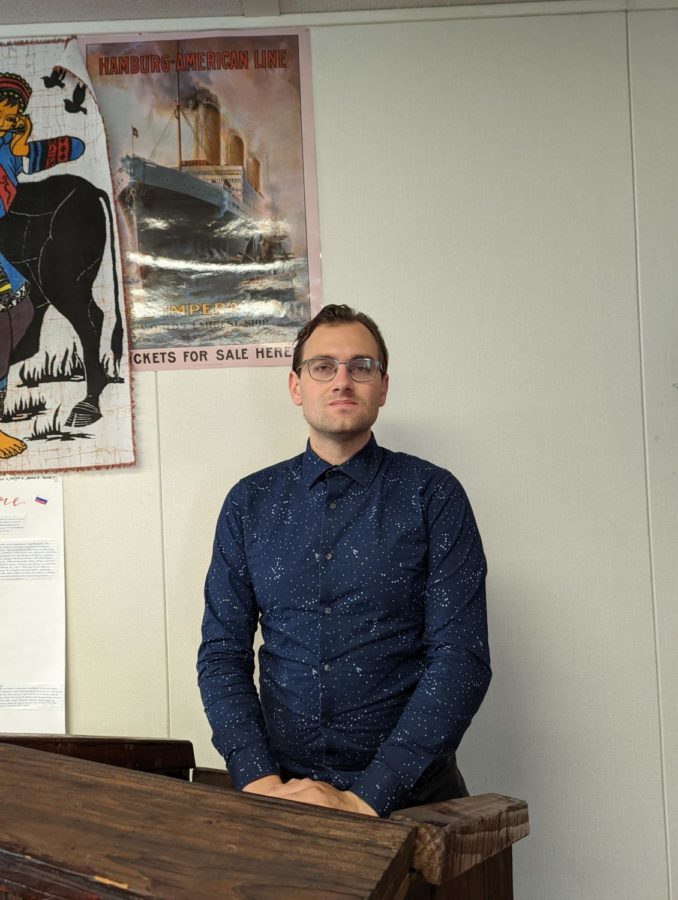Mr. Liddle brings an unconventional approach to his classroom environment
With unconventional approaches to his classroom, Mr. Evan Liddle creates a unique classroom environment that he hopes is beneficial to his students.
April 20, 2022
Unlimited extensions and almost non-existent deadlines are one of the many unconventional approaches that AP World History teacher Evan Liddle takes to his classroom in hopes that his methods are worth it.
With Liddle entering his seventh year of teaching AP World, even with previous experience with teaching five different subjects, he still feels as if AP World is his favorite subject to teach.
“It sounded interesting and I had taught AP Government and it wasn’t as interesting to me, so given the choice, I said I would take AP World,” he said.
Aside from his familiarity with the subject, part of the reason he enjoys teaching the subject is because of the sophomores that generally make up the class. He believes that sophomores tend to be more flexible and have a standing curiosity about the world.
“The best thing about teaching sophomores is that they have not become cynical college-obsessed juniors yet,” he said. “I feel like as an adult, I can still impress a sophomore, whereas I can’t impress juniors because they’ve seen everything already or they think they’ve seen everything already.”
When it comes to discussions, sophomores tend to participate and engage differently compared to older students.
“[Juniors and seniors in his Introduction to Law class] already had their positions on certain topics taken so it was not quite as interesting,” he said.
But no matter the grade level, Liddle has always been teaching subjects related to history, whether that’s AP Government, Politics or Law. He believes that there will always be something new and something to learn.
“I can always add something new to it because of the way that looking at the past works,” he said. “You can make connections that you didn’t see before … And of course, there’s always the fact that you can bring something to the news– something relevant.”
However, he acknowledges that his students can have various opinions on the subject itself and the work involved, no matter how he teaches it. With the workload that comes with the class, he knows that it’s sometimes hard to appreciate the subject.
“You do have to be reading every day, take notes, write essays, short answers. There’s just a lot of content especially with AP World,” Liddle said. “I think for some kids that burns them out a little bit and it’s unfortunate, and I want to say kids do love it by the end, but for some of them, I do know that the work burns some of them out and they just end up hating it because it’s more than they could handle.”
Some of his students, however, argue that his classroom is a great environment, such as sophomore Leo Channa.
“He’s a really good teacher,” he said. “Very respectful to kids and [he] respects our individual characteristics.”
Sophomore Aaron Huang adds that Liddle often takes different approaches to lessons on some aspects of history.
“It is evident that Mr. Liddle is very passionate about teaching his subject as he often incorporates hands-on activities, such as a simulation of an assembly line when teaching about the industrial revolution, and mock trials of significant historical figures like Napoleon and Genghis Khan,” Huang said.
One of the more unique parts of Liddle’s class, however, are the policies he has instigated over the years in terms of homework and tests. His policies include the ability to turn in assignments at any time as long as he knows in advance, as well as unlimited retakes on tests. The only exception is notes, as he said they are necessary to the class functioning. But overall, he stands behind the leniency in his policies.
“School’s important, but it’s also not everything, and I recognize that students have a life outside of school. Someone’s grandma is sick. Someone’s fighting with their dad. Someone is going through severe depression. Someone’s having surgery,” Liddle said. “And whereas some teachers reach out through the one-on-one emails [to] parents, I just decided to make it a class policy. If you just let me know, and I don’t need you to tell me your life story, that’s fine.”
Liddle mentions that he receives pushback about the implications of his policies for the real world, yet even in the workplace, he says, there’s always an ability to negotiate like an adult. But he also adds that “school is not the real world.”
One of the other criticisms he faces is in terms of student motivation to complete the class properly, but he mentions that it hasn’t been that big of an issue.
“Most people will study because they want to do it right the first time,” Liddle said.
Some of his ideas come from what he has learned with his own experience with past teachers, specifically his high school philosophy and statistics teacher who had the same test make-up policy.
“Her philosophy was, if you’re a basketball player and you try to shoot a three-pointer and you don’t get it, does your coach just say, ‘All right, I guess you can’t shoot three-pointers.’ No, your coach will make you do it again and again and again until you get it. So I think it’s the same thing.”
While he admits that the extensions and retakes make his life “a little bit more of a pain” due to the never-ending stream of assignments in need of regrading and tests in need of reassessing, he thinks it’s ultimately worth it.
But Liddle’s classroom policies are not the only way that he attempts to uplift the classroom environment. He tries to engage students differently on a day-to-day basis.
“Sometimes, it’s as simple as, let’s just start our class with a funny video or a funny joke,” Liddle said. “Or sometimes it’s, let me talk about what’s going on in the news and how it is sort of related to what we’ve been talking about or especially if it has something to do with … India or China or Korea or maybe Pakistan [since Dougherty is majority Indian or East Asian]. You could use a little bit of the pre-existing cultural knowledge that all students have, whatever their background might be, to get a little buy-in.”
Especially after COVID, he has made it a goal to increase the amount of activities in the classroom that were separate from the subject at hand.
“Once a week, take some time, work together, you know. Just make class an interesting place to be, for a lack of a better world. Not saying we do that all the time–there is still some rigor and things still need to be done… but I’m trying to balance work and the social and emotional aspect of things,” he said.
Ultimately, Liddle’s philosophies surround a student-centered environment, whether that’s through the content of his class or his words.
Christopher Steele, a fellow DVHS AP World and AP Government teacher, notes that Liddle has taken a slightly different approach to his subjects compared to other teachers.
“I have learned to be flexible in my approach because he is a strong advocate for a student-centered method of inquiry and I think it’s a good approach,” Steele said.
No matter how Liddle ends up going about his teaching methods in the class, his students’ moods and beliefs still come into his consideration, with an ultimate hope that students feel as if they get a chance to figure themselves out in his classroom.
“There are studies that show this works, and it prevents the students from feeling hopeless and thinking that there’s no way they could catch up and do better. And so, if that keeps people bought in and focused and happy to come to class, [then] sure, I’ll do it.”





